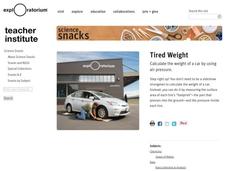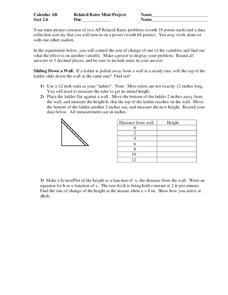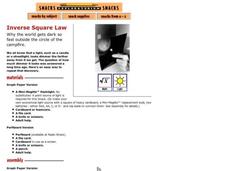Illustrative Mathematics
Who is the Tallest?
A simple question, with a not-so-simple answer. Working with whole and mixed number measurements in inches, feet, and yards presents a problem with many possible solutions. A great activity that challenges the minds of young...
DiscoverE
LIDAR: Mapping with Lasers
We would be lost without maps! How are they made? Introduce junior topographers to LIDAR technology with a fascinating activity. Set up a mock city, then have learners operate a laser measure to determine the shape of the landscape using...
Teach Engineering
What is a Nanometer?
Teams learn about the size of a nanometer by measuring objects and converting those measurements. A worksheet then tests the groups' abilities to use nanometers by having them determine the size of objects that are too small to...
Exploratorium
Tired Weight
You don't need a scale to determine weight. This activity provides a way to use the concepts of air pressure and surface area to determine the weight of a vehicle by calculating the amount of weight each tire supports.
Center for Math and Science Education
Solar System Launch
Trying to understand the vastness of outer space can be quite a challenge for young scientists. Help put things in perspective with this cross-curricular activity as students work in pairs creating scaled models of...
Exploratorium
Tired Weight
Take your class out to visit your automobile and use the tires to compute the weight of the vehicle. This is done by measuring the surface of the tire meeting the ground and the air pressure. This is a fun lesson in the relationship...
PBS
Four Corners
It's imperative to be as precise as possible. Future engineers learn about precision by building a cardboard machine. The base, corners, handles, and paddles must all be assembled with precision or the machine won't work.
Curated OER
Measuring Rainfall
In this activity, students will make a gauge to measure rainfall and see how much rain falls over several days.
Curated OER
How Big is a Foot?
Introducing measurement can be as simple as reading a book and then using measurement tools to understand how big a foot really is. The class reads and discusses the book How Big is a Foot? by Rolf Myller, stopping often to consider...
Houston Area Calculus Teachers
Related Rates
Use a hands-on approach to exploring the concepts of related rates in your AP Calculus class. Individuals explore the effect of the rate of change on a variable related to a variable they control. After analyzing the data they...
Exploratorium
Oil Spot Photometer
Are these two light sources the same? Groups use a white card and a little cooking oil to create a photometer that allows for the comparison of two lights. The Inverse Square Law provides a way to calculate the actual difference in...
Exploratorium
Inverse Square Law
The inverse square law is revealed when your class participates in this activity. They move a graph paper or perfboard square back and forth in a square of light to see how the intensity changes. You will definitely want to add this...
DiscoverE
Wind Farm
A wind turbine is essentially just a giant pinwheel, right? Individuals first create pinwheels from paper, pins, and pencils. In groups, they model a wind farm along a coast and then test out their designs using an electric fan.
Exploratorium
Far Out Corners
Construct a three-dimensional optical illusion when your class is exploring vision and how the eye and brain work together. Three concave corners are mounted inside of a black box, but as a light is shined upon them, they appear to be...













